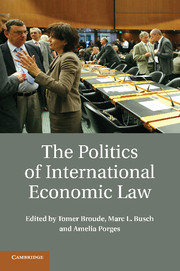Book contents
- Frontmatter
- Contents
- Contributor List
- Acknowledgments
- 1 Introduction
- Part I The Politics of Law Making in International Trade
- Part II The Politics of International Investment Treaty Making
- Part III The Politics of Sovereign Wealth and International Financial Law
- 9 The Politics of Sovereign Wealth Funds
- 10 The Politics of International Financial Law and the Global Financial Crisis
- Part IV The Politics of Dispute Settlement in International Economic Law
- Part V Linkages between International Economic Law and Foreign Policy
- Index
10 - The Politics of International Financial Law and the Global Financial Crisis
Benign Investors or Smoking Guns?
Published online by Cambridge University Press: 03 May 2011
- Frontmatter
- Contents
- Contributor List
- Acknowledgments
- 1 Introduction
- Part I The Politics of Law Making in International Trade
- Part II The Politics of International Investment Treaty Making
- Part III The Politics of Sovereign Wealth and International Financial Law
- 9 The Politics of Sovereign Wealth Funds
- 10 The Politics of International Financial Law and the Global Financial Crisis
- Part IV The Politics of Dispute Settlement in International Economic Law
- Part V Linkages between International Economic Law and Foreign Policy
- Index
Summary
In the postwar period, politics, finance, and law have been inextricably combined. If one thinks of international financial law from a traditional positivist standpoint in which it would be seen as formal state-to-state legal relationships, we have seen remarkably little, given the importance of finance for the stability and development of both individual domestic economies and the international economy. In this context, international financial law would essentially comprise monetary, liquidity, and surveillance arrangements through the International Monetary Fund (IMF) and the financial services provisions of the World Trade Organization (WTO) General Agreement on Trade in Services (GATS). Both of these can largely be seen to operate in the context of traditional realist hegemonic power contexts up to the global financial crisis of 2007–2009. Outside of these, financial law has generally been domestic in nature, though often operating in a cross-border context, with English and New York law being the dominant systems for financial activities. In general, the situation in which private actors structure their relationships under domestic law is the realm of private law and private international law (“private ordering”), along the lines of an anarchic vision of international political economy. However, in between these two extremes is an ever-growing range of nontraditional activities, bringing together politics, finance, and law, usually in the form of “soft law” or “global administrative law.”
In looking at the politics of international financial law, one sees that five aspects emerge from a survey of the postwar period.
- Type
- Chapter
- Information
- The Politics of International Economic Law , pp. 236 - 260Publisher: Cambridge University PressPrint publication year: 2011
- 1
- Cited by

